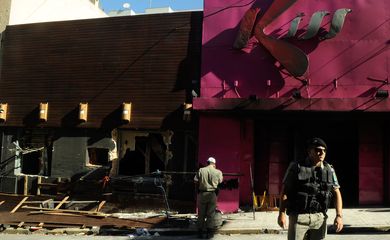
It was supposed to be a night of joy. The “Agromerados” party would mark the graduation of courses such as Agronomy, Veterinary Science and others, at the Federal University of Santa Maria (UFSM), in Rio Grande do Sul. But what happened was a tragedy , one of the greatest in recent history in the country.

On January 27, 2013, Clube Kiss, a nightclub located on Rua dos Andradas, in the center of the city of Santa Maria, received hundreds of young people for the celebration. On stage, two live shows. The first, by a rock band. Then, it was the turn of the boys from the band Gurizada Fandangueira, from the university sertanejo band. The house was packed: between 800 and a thousand people. The club had a capacity for 690 people.
According to the guitarist of the band Rodrigo Lemos at the time, the fire started after a light was lit. He said the bandmates soon tried to put out the fire, but the fire extinguisher would not have worked. One of the members of the band, piper Danilo Jaques, died at the scene.
That day, sparks hit the foam-lined ceiling. In moments the fire spread across the dance floor and soon took over the entire interior of the club. According to firefighters, the highly toxic and strong-smelling smoke caused panic. Then the tragedy began.
Still not knowing what it was, security tried to prevent the exit before payment. There was pushing and shoving. Some managed to leave the place. Many who failed, fainted, intoxicated by the smoke. Others sought out the toilets to escape or seek an air intake and ended up dying. According to experts, the air conditioning system helped to spread the smoke. In addition, a short circuit caused by the fire caused an explosion. 240 people died.
On the social network, one of the survivors, Suzielle Requia, tells how she managed to escape death. Rescued with the help of a friend, she was hospitalized for two days because she felt very short of breath:
"I heard a girl scream: 'Open, open, Kiss is on fire'. When I looked at the stage, I saw a flash. I looked at my friend and said: 'Kiss is really on fire.' And in that he grabbed my hand and pulled me. But I got lost from him, because the smoke had already taken over Kiss. I couldn't see a foot in front of my nose. Even I hit the first rail, I managed to jump that rail and fell out of the club. I passed out."
Occupational therapist Kelen Ferreira survived with serious sequelae. She lost her right foot, had burns in 20% of her body and is still undergoing pulmonary treatment:
"I was hospitalized for 78 days at Hospital das Clínicas in Porto Alegre. Fifteen days I was in an induced coma, another nine in the ICU, which totaled 24, and 54 days in the fourth. I relive January 27 every day".
The police investigation pointed out that a combination caused the tragedy: the material used for sound insulation (with irregular foam), associated with the use of a signal in a closed environment, the single exit, fire extinguisher failures and inadequate air exhaustion. Associated with all this, the sign of overcrowding.
The case moved the entire country and sparked debates about the safety of nightclubs and crowded places.
Also in 2013, the government of Rio Grande do Sul published the Kiss Law, which establishes rules on safety, prevention and protection against fire in buildings and fire risk areas in the state. The example was followed by several other cities. A public hearing in the Senate debated the legislation to prevent and fight fires in Brazil.
In February 2013, the Association of Families of Victims and Survivors of the Tragedy of Santa Maria was created, with more than 28,000 signatures, asking for support from the Public Ministry in seeking justice.
In March of that year, four investigated were pre-emptively arrested. The defendants are Kiss partners Elissandro Callegaro Spohr and Mauro Londero Hoffmann; the vocalist of the band Gurizada Fandangueira, who performed that night, Marcelo de Jesus dos Santos; and music producer Luciano Bonilha Leão.
They are going to the popular jury this December 1st, at the Foro Central de Porto Alegre.
Text translated using artificial intelligence.




